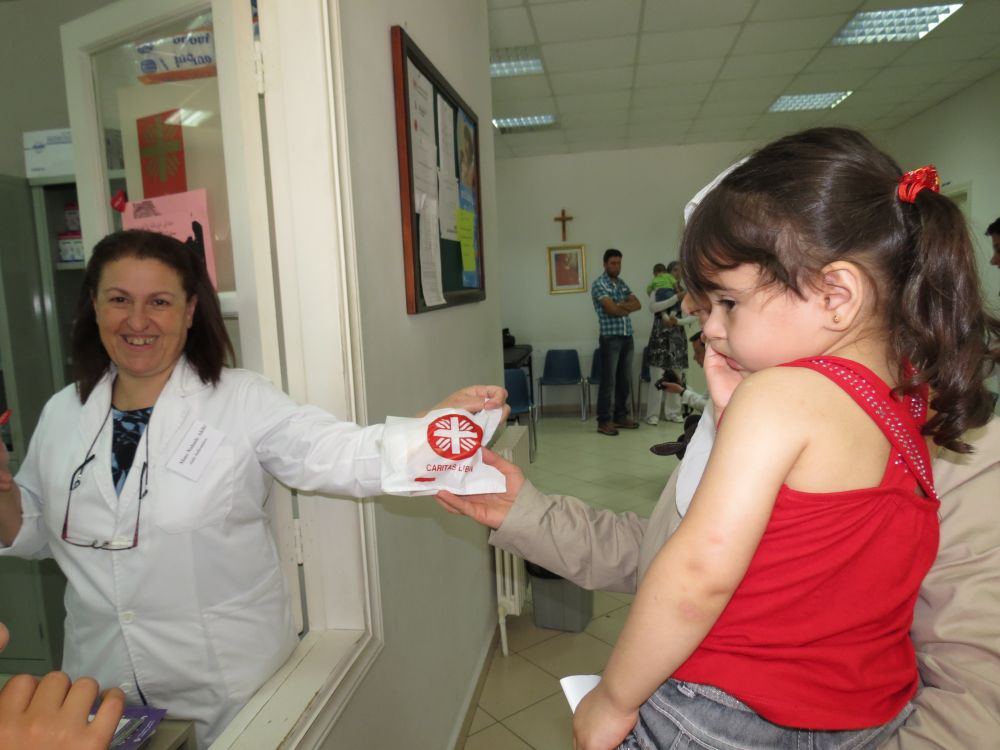
A doctor distributes medicines at the Caritas Lebanon Medical Centre in Reyfoun. Photo by Joêlle El Dib/Caritas Lebanon
By Patrick Nicholson
“There were bodies everywhere,” said Ali. “We had two choices if we wanted to live: Turkey or Lebanon. We came to Lebanon because I thought I would find work.”
Ali (49), Aaicha (34) and their five children came to Lebanon 18 months ago from Idlib in north-western Syria. The deciding factor was when the next door house was hit by a rocket, killing 18 people.
Life in Syria had gotten progressively worse for them since the start of the conflict in early 2011. There was no electricity or running water. Inflation was rampant. What cost 15 Syrian pounds before the war, now cost 150 Syrian pounds.
“You had to stand in line for three hours just to buy bread,” said Ali. And then there were the bombs, rockets and air attacks.
When they first arrived in Lebanon, the family lived in a small tent. Now they rent a room in Mount Lebanon for $250 per month. Ali hasn’t been able to find regular work and it is hard to make ends meet.
“It’s safe at least, but our economic situation makes me feel stressed,” said Ali. “Food is the biggest need and money for rent.”
Ali and Aaicha have brought two of their children, Rahaf and Abdullah, for vaccinations at the Caritas Lebanon centre in Rayfoun. It is part of the medical service Caritas gives to Syrian refugees.
“We provide primary care, tests and medicine for free to the Syrian refugees,” said Caritas Lebanon’s Rania Bteich, who works at the centre. They also give vaccinations, paediatric and obstetric treatment and psychiatric care for trauma. “There is a lot of anxiety and stress,” she said.
Caritas Lebanon will provide vital primary health care to 1,500 Syrian refugees over the coming months. They will also cover gaps in more serious illnesses for 500 Syrian refugees.
Part of that health response is the Caritas mobile clinics that tour the Bekaa Valley to provide health care to Syrian refugees living there.
“We see lots of diarrhoea,” said Dr. Joseph Homsi, who is with the mobile clinic, today in the Caritas centre in Taalabaya. There are many cases of scabies, lice, skin allergies and leishmania, a nasty parasite that causes terrible sores on the sin.
“Most of the problems are due to the unhygienic living conditions,” said Dr. Joseph. Caritas is running health awareness sessions for the refugees, showing simple techniques on how to stay healthy and avoid infection.

Dr. Joseph Homsi with Nour Al Hlwa and her children AbdelRahman and Yamen. Photo by Patrick Nicholson/Caritas
Nour Al Hlwa (23) has brought her children AbdelRahman (6) and Yamen (4) to see Dr. Joseph today because they have flu. Her family only arrived in Lebanon a few days ago after fleeing the Syrian capital Damascus.
They left because of the bombing, kidnappings, lack of food, schools and hospitals. “The most important thing was to protect our children,” she said. “It is impossible to stay safe in Syria.”
She is worried about how they will manage in Lebanon. “Our first need is to find a job for my husband,” she said. “If he works we don’t need charity. We will be able to buy clothes, mattresses and food ourselves.”
There are over a million Syrians in the same situation though. Everyone needs work and that’s driving wages down.
Nour hopes for an end to the war so her family can return home. So do Ali and Aaicha. But when asked how soon peace will return to Syria, Ali says, “10 years, maybe”.
As well as working on health, Caritas will distribute hygiene kits, clothes, fuel vouchers, blankets and other aid to 15,000 very vulnerable people over the next 6 months. Caritas will also provide 400 Syrian families with rent assistance and help 1000 children with transport so they can get to school.
“Our role is to stand by them,” said Caritas Lebanon President Fr Simon Faddoul. “People don’t just need material aid, they also need affection. Our Caritas workers listen to their pain and that regenerates hope in them.”
“The Syria crisis has been one of the most difficult tasks we have ever faced. But I’m amazed by the resilience of the Syrian refugees,” he said. “Their unrelenting human spirit gives hope back to us.”
